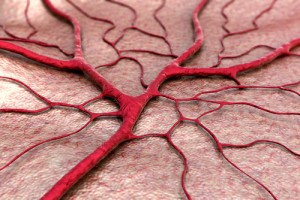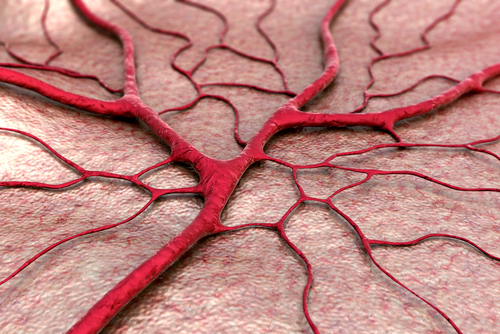 A new study funded both by the Diabetic Complications Consortium of the National Institute of Diabetes and Digestive and Kidney Diseases is examining the effect of a protein in reversing the endothelial dysfunction that occurs in diabetes.
A new study funded both by the Diabetic Complications Consortium of the National Institute of Diabetes and Digestive and Kidney Diseases is examining the effect of a protein in reversing the endothelial dysfunction that occurs in diabetes.
Blood vessels play a key role in diabetes helping to transport glucose and insulin, but high blood glucose levels can damage blood vessels. However, it is not clear how this damage occurs. Dr. Belin de Chantemele, a researcher from the Georgia Regents University, is examining a protein that may be responsible for the endothelial dysfunction that occurs in blood vessels of diabetics.
It is known that one of the key determinants of vascular dysfunction in diabetes is a reduction in the production of nitric oxide by the blood vessels endothelial cells. Nitric oxide is a blood vessel dilator, and has been found to decrease excretion of cytokines, which are the cells of the immune system that promote inflammation, thus increasing a turbulence in the blood flow, and consequently increasing cytokine secretion.
Ultimately, these immune cells attack the blood vessel lining. In this context, researchers while examining the behavior of PTP1B found that mice without this protein presented higher blood pressure although they didn’t have the endothelial dysfunction. In a subsequent experiment, researchers observed that the endothelial dysfunction was not present in mice diabetes type 1 induced missing the protein.
“We know that diabetes increases PTP1B expression in all those tissues, the muscle, the liver, fat, and what we want to see now is if diabetes also increases PTP1B in endothelial cells and if that increased expression leads to the endothelial dysfunction” Belin de Chantemele said in a recent press release.
Dr. Vijay Patel from the Medical College of Georgia is leading a study testing PTP1B expression in the endothelial cells in diabetics’ versus patients without diabetes. Dr. Patel is analyzing markers of a stressed out endoplasmic reticulum (ER). The ER are organelles responsible to unsure that cells contain adequate calcium levels, which is vital to cell function, and regulates the folding of proteins.
In the case of the protein PTP1B, it appears to be a reciprocal relationship, with this protein being thought to regulate ER function. The ER is stressed by high glucose in diabetes and its sustained activation in this disease that makes endothelial cells to die. However, this new connection with the protein PTP1B is yet to be understood, and its difficult to develop drugs to inhibit the protein, since PTP1B has its own features that are fundamental for the human body, such as controlling the body’s sensitivity to insulin and leptin.
Current findings indicate that PTP1B inhibitors are likely to be successful with weight loss and diabetes: “If you have more leptin secretion and your brain is less sensitive, you will continue to eat and become more obese,” Belin de Chantemele said in the press release.
Belin de Chantemele’s findings about the roles of PTP1B will aid promising results for the development of a target inhibitor.


